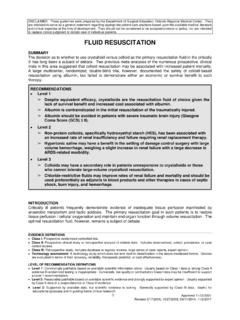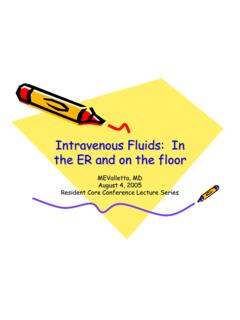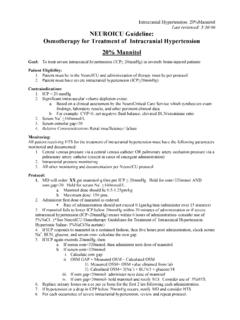Transcription of MEDICAL ALTERNATIVES TO BLOOD TRANSFUSION (WITH …
1 1 of 4 West Tennessee Healthcare Integrated Laboratory Physician s Laboratory HandbookPolicy #: 703 (PLH-703-001) Effective Date: 5/16/2011 Reviewed Date: 8/1/2016 Subject: MEDICAL ALTERNATIVES TO BLOOD TRANSFUSION (WITH SPECIAL CONSIDERATION FOR JEHOVAH S WITNESSES PATIENTS Approved by: Laboratory Director, Jerry Barker (electronic signature) Approved by: Laboratory MEDICAL Director, Mark P. Burton, MD (electronic signature) Approved by: Affiliate Lab MEDICAL Director, Chris Giampapa, MD (electronic signature) Approved by: Affiliate Lab MEDICAL Director, Paul J. Sims, MD (electronic signature) Approved by: Affiliate Lab MEDICAL Director, Williamson, MD (electronic signature) MEDICAL ALTERNATIVES TO BLOOD TRANSFUSION (WITH SPECIAL CONSIDERATION FOR JEHOVAH S WITNESSES PATIENTS) For personal or religious reasons, a patient may seek out modern scientific therapy with the exception of TRANSFUSION .)
2 For Jehovah s Witnesses, the prohibition against BLOOD transfusions applies to whole BLOOD , packed red BLOOD cells, white BLOOD cells, plasma, and platelets, including autologous transfusions. However their teaching does not absolutely forbid minor BLOOD fractions such as immune globulins, albumin, erythropoietin, and clotting factors. Except in emergency situations, a physician can decline to enter into a fiduciary relationship with the patient who places unacceptable conditions on a treatment plan, as long as the physician assures that the patient is not abandoned. In an effort to assist physicians who find themselves treating any patient who does not wish to receive a TRANSFUSION , this document will help to provide information in regards to ALTERNATIVES for TRANSFUSION .
3 It will first begin with general management principles and general therapeutic principles. GENERAL MANAGEMENT PRINCIPLES 1. Formulate a detailed and individualized clinical management plan to minimize BLOOD loss and treat anemia. 2. Obtain informed consent for anticipated or potential procedures. 3. Refer patients to another institution if better resources are available elsewhere. 4. Employ a multidisciplinary team approach to develop the most appropriate BLOOD management strategy and communicate this management plan to all team members. 5. Maintain surveillance for BLOOD loss or psychological deterioration (prompt action to prevent or control abnormal bleeding is essential with a threshold for intervention lower than for patients who will accept allogeneic BLOOD TRANSFUSION ).
4 MEDICAL Center Laboratory Physician s Laboratory Handbook| PLH 703 2 of 4 West Tennessee Healthcare Integrated Laboratory Physician s Laboratory Handbook6. Prompt action to secure hemostasis in the actively bleeding patient who refuses BLOOD TRANSFUSION (avoid a watch and wait approach to the bleeding patient). 7. Be prepared to modify routine practice when conditions change. 8. Consult specialists experienced in managing patients without allogeneic TRANSFUSION at an early stage of the patient s care. 9. Transfer a stabilized patient, if necessary, to a major center before the patient s condition deteriorates.
5 GENERAL THERAPEUTIC PRINCIPLES 1. Adopt a proactive approach including anticipation, preparation, and management steps to prevent uncontrolled BLOOD loss, utilizing a combination of interventions. 2. Perform a thorough preoperative workup. 3. Identify appropriate management strategies to optimize the patient s condition before surgery. 4. Restrict diagnostic phlebotomy. 5. Combine surgical and anesthetic BLOOD conservation techniques to maintain meticulous surgical hemostasis and minimize BLOOD loss. 6. Optimize oxygen delivery and consider measures to minimize oxygen consumption.
6 7. Perform immediate concomitant investigation, diagnosis, and early intervention aimed at rapidly controlling hemorrhage. STRATEGIES FOR AVOIDING AND CONTROLLING HEMORRHAGE AND ANEMIA WITHOUT BLOOD TRANSFUSION I. Surgical Devices to Minimize BLOOD Loss Electrocautery/Electrosurgery Laser surgery Argon beam coagulator Stereotactic radiosurgery Microwave coagulating scalpel Ultrasonic scalpel II. Techniques and Devices to Control Bleeding and Shock A. For Bleeding: Direct pressure Ice packs Elevate body part above level of heart Hemostatic agents Prompt surgery Tourniquet Controlled hypotension B.
7 For Shock: Trendelenburg/shock position (patient supine with head lower than legs) MEDICAL Antishock Trousers ( ) Appropriate volume replacement after bleeding controlled MEDICAL Center Laboratory Physician s Laboratory Handbook| PLH 703 3 of 4 West Tennessee Healthcare Integrated Laboratory Physician s Laboratory Handbook III. Surgical and Anesthetic Techniques to Limit BLOOD Loss Hypotensive anesthesia Induced hypothermia Acute normovolemic hemodilution* Hypervolemic hemodilution Intraoperative/Postoperative BLOOD salvage* Laparoscopic surgery Reduce BLOOD flow to skin Meticulous hemostasis Arterial embolization Preoperative planning: Enlarged surgical team/Minimal time Surgical positioning Staging of complex procedures IV.
8 Devices and Techniques That Limit Iatrogenic BLOOD Loss Transcutaneous oximeter Pulse oximeter Microsampling equipment Essential tests only Multiple tests per sample Smaller samples (pediatric-sized tubes) V. Volume Expanders A. Crystalloids Ringer s lactate Normal saline Hypertonic saline B. Colloids Pentastarch/Hetastarch Gelatin Dextran VI. Hemostatic Agents for Bleeding/Clotting A. Topical: Avitene Gelfoam Oxycel Surgicel Tissue adhesives* B. Injectable: Tranexamic acid e-Aminocaproic acid Desmopressin MEDICAL Center Laboratory Physician s Laboratory Handbook| PLH 703 MEDICAL Center Laboratory Physician s Laboratory Handbook| PLH 703 4 of 4 West Tennessee Healthcare Integrated Laboratory Physician s Laboratory HandbookVitamin K C.
9 Other Agents: Aprotinin Conjugated estrogens Vasopressin Cryoprecipitate* Recombinant factor VIIa VII. Therapeutic Agents and Techniques for Managing Anemia Stop any bleeding Oxygen support Perfluorocarbon-based oxygen carriers (when available) Maintain intravascular volume Hematinics (iron, folic acid, vitamin B12) Erythropoietin (rHuEPO)* Nutritional support Immunosuppressive agents if indicated Hyperbaric oxygen therapy Tolerate lower degree of normovolemic anemia (10/30 rule has no scientific basis) * Confirm acceptability of these modalities with patients who are Jehovah s Witnesses There is a hospital liaison committee for Jehovah s Witnesses which is available as a 24-hour service.
10 The contact phone number is area code 718-560-4300. They will help to arrange a local hospital liaison to provide patient and physician support services. The majority of the references and information for this memorandum were provided by the Hospital Information Services for Jehovah s Witnesses.






